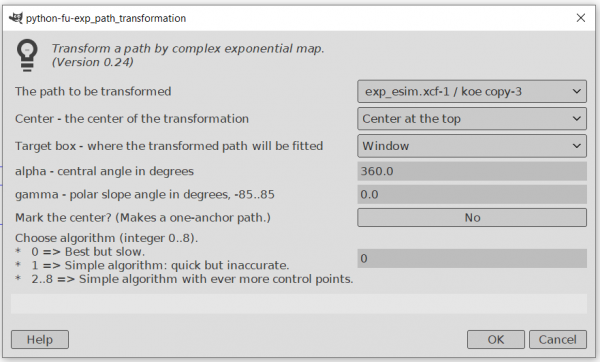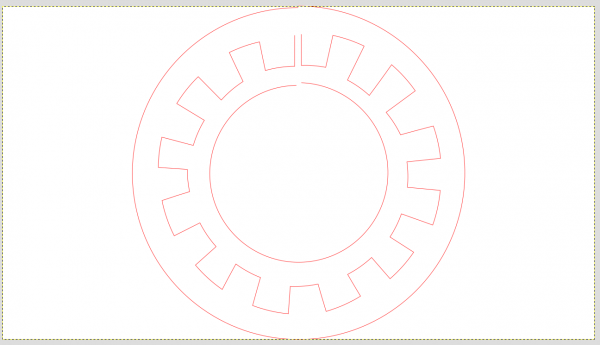11-27-2020, 08:17 PM
Thanks for remembering my plugins, Rich. It seems that I have difficulties remembering myself what I have done. Must be the old age...
There is also the Exponential map among my transformation plugins. I made the following test path:

Then I called the Exponential map with the following inputs:

and I got the following:

The exponential map means the complex exponential map when the plane is viewed as the complex number plane. In its basic form it sends horizontal lines to circles, vertical lines to rays emanating from a common point, and all other straight lines to logarithmic spirals. In the example above you see two big circles, and a lot of small circle arcs and line segments.
To get the plugin, go to
http://kmarkku.arkku.net/Path_transforma...aster.html
Scroll to the bottom and press the Download button. Unzip the .zip file you get and put the .py file it contains in your Gimp's user plug-ins folder. Restart Gimp. You find the plugin in Gimp's menu by going to the Paths tab, right-clicking the path you wish to transform, and following Tools > Transformations > Exponential map.
Then you can go experimenting. You can start with the same inputs as in the picture above. BUT: The last input in the GUI is choosing the algorithm. I recommend that you do experiments by setting the algorithm to 4 (or 5 or 6). Only after you are satisfied with the result, set the algorithm to 0 and run the plugin again. Namely, with algorithm=0 the plugin is slow but gives the best result. With all other values the plugin is fast but the result may be unsatisfactory (weird even) and the resulting path will have a very large number of anchors.
I hope this helps. If you have problems with the plugin, please ask.
There is also the Exponential map among my transformation plugins. I made the following test path:
Then I called the Exponential map with the following inputs:
and I got the following:
The exponential map means the complex exponential map when the plane is viewed as the complex number plane. In its basic form it sends horizontal lines to circles, vertical lines to rays emanating from a common point, and all other straight lines to logarithmic spirals. In the example above you see two big circles, and a lot of small circle arcs and line segments.
To get the plugin, go to
http://kmarkku.arkku.net/Path_transforma...aster.html
Scroll to the bottom and press the Download button. Unzip the .zip file you get and put the .py file it contains in your Gimp's user plug-ins folder. Restart Gimp. You find the plugin in Gimp's menu by going to the Paths tab, right-clicking the path you wish to transform, and following Tools > Transformations > Exponential map.
Then you can go experimenting. You can start with the same inputs as in the picture above. BUT: The last input in the GUI is choosing the algorithm. I recommend that you do experiments by setting the algorithm to 4 (or 5 or 6). Only after you are satisfied with the result, set the algorithm to 0 and run the plugin again. Namely, with algorithm=0 the plugin is slow but gives the best result. With all other values the plugin is fast but the result may be unsatisfactory (weird even) and the resulting path will have a very large number of anchors.
I hope this helps. If you have problems with the plugin, please ask.



